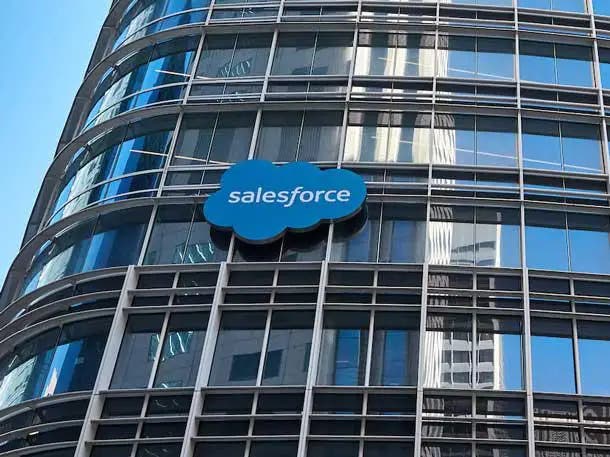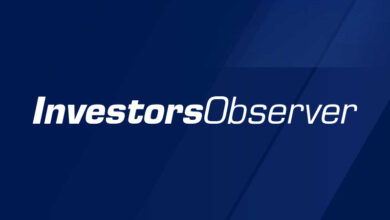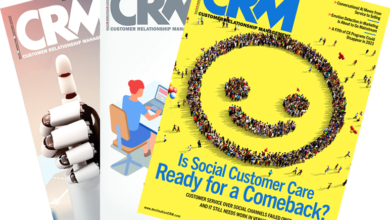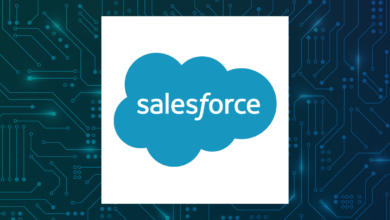Salesforce Q1 Earnings Preview: 5 Things To Know

Customer AI spending, Data Cloud traction and MuleSoft progress are expected to come up.
A pulse on customer spending on artificial intelligence. Traction in Data Cloud and Einstein 1. And continuing progress in MuleSoft.
These are some of the major topics expected to come up Wednesday during Salesforce’s earnings call for its first fiscal quarter, ended April 30. The San Francisco-based customer relationship management (CRM) vendor has positioned itself as a potential leader in AI and generative AI thanks to the volume of data its products interact with.
A report Tuesday from Wedbush was optimistic about Salesforce’s upcoming report. “We are expecting CRM to deliver headline results that should modestly beat Street expectations,” according to the report. “We believe this will (be) another step in the right direction on the comeback story for Salesforce to further prove to the Street a renaissance of growth is on the doorstep for the CRM stalwart for FY25.”
[RELATED: Salesforce Drops $11B Informatica Acquisition Pursuit: Reports]
Salesforce Q1 Earnings
A May 20 report by Morgan Stanley put first fiscal quarter current remaining performance obligation (cRPO) “slightly ahead of our forecast for $26.8 billion and 11.1 percent YoY (versus guidance for ~11 percent and Street inline with our estimate),” with low-90 percent gross dollar retention on subscription annualized contract value (ACV) and flat year-over-year net-new subscription ACV growth.
The report sought to temper expectations for Salesforce full fiscal year guidance, noting that “of the last five Q1 prints, management lowered the full year guidance by ~(0.8) percent on average.”
Foreign exchange rates could also spoil otherwise good news from Salesforce, according to the investment firm’s report.
However, partner feedback to Morgan Stanley suggested “a healthy pipeline for the rest of the year,” with second fiscal quarter cRPO guidance likely “to come roughly inline with our 10.4 percent YoY estimate, translating to FQ2 constant-currency cRPO guidance of ~10 percent YoY.”
Morgan Stanley expects Salesforce executives to “maintain full year (revenue) guidance from FQ4 print at $37.7B-$38.9B (+8-9 percent YoY),” according to the report.
In a May 15 report, Bank of America predicted that Salesforce would see a “healthy 1 percent beat to 12 percent” cRPO and sustained 30 percent free cash flow growth. The firm said it believes Salesforce “can gain share and outpace industry growth 14 percent.”
Here’s more of what you need to know.

AI Spending
Wedbush said in its report that successfully monetizing AI in the Salesforce installed base “is a major land grab opportunity that could significantly benefit CRM over the coming years and could increase overall revenue by $4 billion+ annually based on our estimates and field work by 2025.”
“The installed base opportunity is still underappreciated by the Street in our opinion as the CRM machine takes hold over the coming quarters in a much more efficient manner,” according to Wedbush.
In a Friday report, KeyBanc voiced caution on Salesforce’s “core business strength” because of “weakness in fundamentals from software firms that get their revenue from what we’d call traditional or regular or maintenance IT budgets rather than the dollars created for AI or hardware refreshes,” calling the CRM vendor’s business “right down the middle of that framework.”
Salesforce has been having success boosting its margin through cost-cutting, masking some of the potential weakness, according to the investment firm.
During HubSpot’s quarterly earnings call earlier this month, CEO Yamini Rangan said the CRM rival “saw a return to weaker demand conditions in the first quarter, similar to what we experienced in 2023,” according to a call transcript.
That report from HubSpot – rumored to be an acquisition target by Google parent Alphabet – left KeyBanc analysts wondering about Salesforce’s experience.
“Differences in fiscal years and end customer scale lead us to have some hope for Salesforce,” according to KeyBanc.
Morgan Stanley’s May 20 report said that “it remains too early to see a GenAI benefit” to Salesforce’s revenue while staying “constructive on the medium term opportunity,” according to the firm’s report. Google’s possible interest in HubSpot also shows the value of CRM for unlocking the value of GenAI.
“We see Salesforce well positioned to expose GenAI capabilities within their sticky workflow to the large customer base, rather than businesses building new workflows around GenAI functionality,” according to Morgan Stanley.
Estimated times of GenAI project deployment are more toward the second half of 2024 and even 2025, according to Morgan Stanley.

Data Cloud Traction
Data Cloud could prove a bright spot for Salesforce, according to KeyBanc’s report. The firm called Data Cloud “the tip-of-the-spear for AI demand” because this product is “where customer data is consolidated and cleaned to be ready for usage by” the Einstein 1 AI application.
“We believe that even if the core suffers from the same sluggishness that has plagued the rest of the sector, if the Data Cloud shows solid growth or potentially accelerating growth off the 90 percentin CY24, shares would react positively,” according to KeyBanc.
One factor interfering with a sunny outlook by KeyBanc for Salesforce’s Data Cloud is its reputation as “a difficult sale for partners,” based on the firm’s research. MuleSoft and Slack, on the other hand, appeared to outperform partner expectations.
“Feedback from the partner community did not boost our confidence on weaker than expected results, particularly around new customer generation outside of Salesforce-sourced leads,” according to KeyBanc. “We’ll be paying particular attention to Data Cloud as management is putting a very significant emphasis on results here on direct go-to-market and with the partner community motion. Upside or shortfalls here could signal revenue reacceleration or echo macro environment headwinds like the broader software space is seeing.”
Conversely, Morgan Stanley’s May 20 report on partner feedback saw “early positive partner commentary on Data Cloud.”
That feedback “reaffirms our view of Salesforce’s solid positioning ahead of future GenAI product adoption in the medium-term,” according to Morgan Stanley. “Salesforce’s position as a front office application vendor should position the company in the right place for GenAI, where we will look to Data Cloud as the leading indicator for demand.”
For now, Data Cloud is “still mostly bundled into higher level SKUs at a discount,” according to the report.
The Bank of America report said that the Salesforce fiscal year 2025 outlook “assumes little/no incremental subscription revenue from Data Cloud,” but even “just 1 percentshare of the $29.6 billon non-relational database industry represents an incremental 1 percentof subscription growth by Q4.”
Earlier this month, Salesforce revealed that it will make a Data Cloud for Commerce offering generally available in the summer for business-to-business commerce customers. A business-to-consumer commerce customer version will become GA in the fall.
Data Cloud for Commerce promises retailers the ability to bring product details, inventory status, transactional history and other enterprise data together with customer data in a single view, according to Salesforce.
An Einstein Personalization offering will enter restricted GA in the summer, giving users a way to leverage real-time customer data in Data Cloud for marketing campaigns that automatically trigger next best offers and personalized content, according to the vendor.

Einstein 1, Slack Updates
In the KeyBanc report, the investment firm said it hopes for updates on the Einstein 1 platform, “what management is doing to differentiate the offering and generate upsell opportunities.”
Morgan Stanley’s report saw “increased interest for Einstein, but acknowledged the pipeline skews towards POCs rather than larger deal deployments.”
Still, Einstein 1 and fellow applications should be “the primary way for businesses to take advantage of GenAI,” although “penetration within existing customer base is still nascent and features are continuing to improve to better suit organizations’ tailored needs,” according to the firm.
Earlier this month, Salesforce introduced Einstein Copilot for Marketers and Copilot for Merchants, unified conversational AI assistants built on the Einstein 1 Platform, grounded in company-specific data stored within Data Cloud and connected to Salesforce metadata.
Einstein Copilot for Marketers will become generally available (GA) in the summer. Copilot for Merchants will enter beta in the fall, according to Salesforce.
Meanwhile, Wedbush’s report noted “major strides around integrating Slack on the back-end into the broader CRM suite” – a move that “could fuel some major collaboration deals we believe as the pipeline is finally starting to build on this key acquisition.”

Partners Positive On MuleSoft
Wedbush’s Tuesday report said that partner checks showed “stronger cross-sell activity this quarter,” especially “with a number of larger more transformational suite wide deals inked during the quarter” with Salesforce subsidiary MuleSoft.
Still, the firm noted that “some partner checks were also mixed,” which showed that the Salesforce “story is still navigating some headwinds in the field.”
A May 20 report from Morgan Stanley said that partner checks pointed “to stable demand supporting an in-line quarter, while pipeline improvements drive cautious optimism for improvement later in the year.”
MuleSoft and the industry clouds had “better-than-expected” performances, according to Morgan Stanley. Health, Government and Nonprofit clouds were particular standouts.
Sales and Marketing clouds were in line, according to Morgan Stanley. Commerce Cloud was mixed. Service Cloud lagged.

Salesforce Summer Pricing Effects
Partners expressed to Morgan Stanley “optimism for improvement of Salesforce spend through FY25/CY24, but maintained full year targets given Q1 is a smaller quarter and it is early in the year,” according to the firm’s report. Partners don’t “expect GenAI to drive meaningful revenue this year.”
“Though sales cycle has not yet snapped back to pre-COVID levels, partners remained optimistic on growth outlook for the full year, targeting either flat or accelerating YoY growth,” according to the Morgan Stanley report. “Partners mentioned that premium SKU tiers (Unlimited, Unlimited+) are picking up in customer interest, but not yet materializing to numerous deals.”
Partners told Morgan Stanley about a “higher propensity to discount on net new accounts, and highlighted that pricing uplifts are in the range of 5-6 percent as a result of Salesforce’s price increases last summer,” according to the firm.
A May 15 report from Bank of America said that the firm’s own partner feedback research suggested “sustained demand” with Data Cloud – along with Marketing Cloud and the industry clouds for health care and financials – among the standout products.
“We spoke to a dozen key Salesforce partners and feedback suggests deal activity holding with healthy levels in Q4,” according to Bank of America. “We noted a slightly higher mix of partners citing better than expected results, versus inline. However, the global SI partner base was more balanced.”
The report cited a “healthy attach of” Data Cloud pilot deals to renewals and stability in Sales and Service clouds deals.



